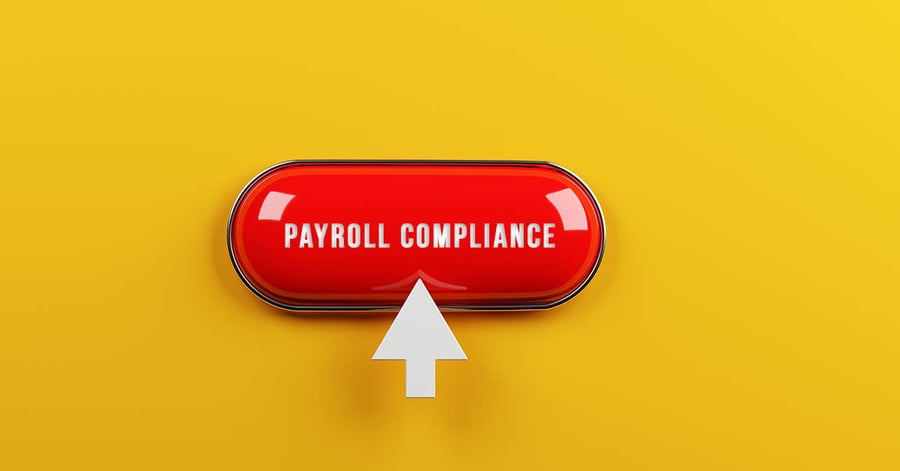
- Home
- Global Payroll
- Payroll Compliance Tips & Tech for Error-Free Payroll
Payroll Compliance Tips & Tech for Error-Free Payroll
Payroll Compliance Best Practices Every HR Leader Should Know
8:32
Published :

Payroll compliance brings many nuances from the regulations, guidelines, applicability, and agreements owing to continuous revision of tax and labor laws. It is pertinent to be careful about the above payroll aspects and avoid error and penalties. As per the statistics, in USA, $6 billion in employer penalties were assessed by the IRS in 2020 and as many as 30% of businesses were reported to have misclassified their employees. Paycheck error has also been experienced by as many as 25% of the employees and around 82 million employees in US have been affected by payroll problems. The solution of all these concern lies in having a robust and trustful payroll system in place. An up-to-date compliant payroll solution not only benefits employers but also increases the employee experience. Therefore, the companies must ensure compliance with technology that would help make the process more seamless and adopt mechanisms that comply with the most important regulations.
Here are the five important tips with regards to payroll compliance that would help serve the company in a better way:
“Manual payroll" refers to the process of paying employees by completing a payroll run without the aid of software. This means that employee deductions and benefits must be calculated and remitted manually, and the payroll manager must ensure that the employee receives his/her net pay. Now this seems simple but involve risk of miscalculation, under/over tax deduction and delay in payment of dues, excess cost to company etc. It also creates lot of duplication and scattered effort in case the business is globally set. “Automated payroll system” on the other hand is a system that limits the likelihood of human error from manual data entry by using technology and automate the process for seamless experience. So, switch to advanced and trusted payroll software that will manage all the statutory and payroll compliance efficiently and effectively without much effort.
To apply or not to apply, that’s the question and the best way to answer the same is to know what different payroll compliances are and which one applies to you. Having thorough knowledge, makes further process hassle free. From being compliant for the minimum wage payment, to maternity benefits, to provident funds etc. needs not only a lot of time but also experts who can give advice on all these compliance measures. Payroll solutions can help in this regard by providing updated information on various compliance matters.
“If you're proactive, you focus on preparing. If you're reactive, you end up focusing on repairing.” The same applies with payroll, keeping track of all possible changes affecting payroll not only helps you to be compliant but also ensures ample time to implement the same. Payroll systems can help in tracking these updates and ensuring timely implementation.
Post COVID-19, a change in trend on regulatory updates have been seen, which on one side is a welcome change but at the same time adds burden on employers to keep a track of the regulations, understand them in context of the business as well as employees and apply the same considering different scenarios which may be applicable on employees.
Regulatory updates can be tracked from various sources like official notification or by having a trusted partner. Check out Ramco's Compliance portal with latest payroll related updates from 50+ countries and more!
However only tracking the updates won’t help unless it is implemented on time. Many changes including rates, reports, allowances etc. comes with specific deadline to implement. Implementing the same within deadline not only makes you win the race by paying employees accurately but also saves you tons of money for breaching the deadlines
In many countries tax benefits and deductions are linked to the employee personal information like marital status, count of dependents, expenditure incurred for dependents etc. So, it is pivotal that the companies keep the information of their employees regularly updated in their payroll system to avoid inaccuracy of payroll calculations like tax or social security. Companies can even implement self-service tools within their payroll systems that allow employees to enter their details just in time, making the process much faster.
Report formats are generally predefined by the authorities. Making sure that report generated by the payroll systems is up to date, accurate and covers correct content, avoids unnecessary errors and delays in filing thus saving efforts and fines.
With digitalisation, direct integrations are being adopted by authorities in many countries whereby reports handling becomes quite complex like Annual tax report and wage tax return in Netherland, PIT 4R, ZUS DRA and ZUS RSA in Poland, 08 report in Hungary etc. The integrated filing requires to build complex APIs and input files as well which requires expert guidance. With the right team onboard or a compliant third part vendor or a payroll system can save lots of your efforts on compliances and negate the chances of error in filing complex reports.
As payroll regulations continue to evolve, businesses must adopt technology-driven strategies to maintain accuracy, avoid penalties, and enhance employee satisfaction. The integration of payroll software and data-driven payroll solutions has become an essential step in transforming compliance from a reactive process into a proactive business function. Modern organizations are embracing automated compliance models to reduce administrative burdens and ensure adherence to increasingly complex statutory mandates.
Advanced payroll software enables real-time monitoring of tax changes, regulatory updates, and employee data variations. Automated alerts and built-in compliance checks minimize errors and help HR teams implement updates before deadlines. Furthermore, AI-enabled payroll solutions can analyze historical payroll data to predict discrepancies and suggest corrective actions, making compliance not only achievable but measurable. This reduces manual intervention and allows organizations to scale payroll operations with confidence.
A major compliance challenge lies in the fragmented storage of payroll and employee information. By adopting centralized payroll software, companies can consolidate employee records, historical payments, tax declarations, and regulatory filings into a secure system. This prepares businesses for internal and external audits while ensuring transparency in payroll practices. The integration of payroll solutions with ERP and HRMS platforms also enhances decision-making and provides a single source of truth for payroll governance.
Payroll compliance is no longer just an operational necessity; it is a strategic advantage. Businesses that deploy smart payroll software and scalable payroll solutions can efficiently manage multi-country operations, adapt to legal changes, and maintain a strong employer brand. With digital transformation shaping the future of workforce management, technology-driven compliance will play a defining role in building resilient, compliant, and future-ready payroll ecosystems.
Depending on the type of industry and the type of business there can be many regulations that an organization must comply with making payroll compliance complex and challenging to maintain at times. If you think being compliant is costly and tiresome then dare not to be compliant. Non-compliances not only make you pay hefty but also demotivates employee and is detrimental to business’s reputation. Hence, it is paramount to tend to these tips mentioned above, which would help improve a payroll system, help a business avoid major issues and keep the stakeholder satisfied.
Payroll compliance is crucial for businesses to avoid financial penalties, legal risks, and reputational damage. Non-compliance can lead to fines, misreported taxes, and incorrect employee benefits. Globally, companies face complex regulations, including minimum wage, social security contributions, and labor laws. Ensuring payroll compliance safeguards the organization, improves employee trust, and supports smooth business operations across countries.
Automated payroll processing minimizes human errors by calculating taxes, deductions, and benefits accurately. It ensures timely salary payments, correct statutory contributions, and proper reporting to authorities. Automation also helps multinational businesses comply with different regulations across countries, reducing the risk of fines and audit issues. Advanced payroll systems streamline workflows, provide audit trails, and enable real-time compliance monitoring.
Regulatory requirements for payroll, taxes, and labor laws change frequently, especially after events like COVID-19 or annual legislative updates. Proactive tracking allows businesses to implement changes on time, ensuring accurate employee payments, correct deductions, and compliance with local laws. Payroll systems with automated update tracking reduce the risk of penalties and enable HR teams to adjust payroll processes efficiently across multiple countries.
Accurate employee data, such as marital status, dependents, and tax allowances, is critical for correct payroll calculations. Inaccurate information can result in overpayment, underpayment, or miscalculated taxes, leading to penalties and employee dissatisfaction. Centralized payroll systems with self-service portals allow employees to update their data in real time, ensuring compliance with local and global payroll regulations.
Modern payroll software consolidates payroll records, historical payments, and regulatory filings into a centralized system, making reporting accurate and timely. Automated reporting reduces errors, supports compliance with country-specific formats (e.g., Netherlands’ wage tax return, Poland’s ZUS reports), and simplifies audits. Integration with HR and accounting systems provides a single source of truth, improves transparency, and ensures businesses are ready for both internal and external audits.
Common payroll compliance risks include misclassification of employees, late tax payments, incorrect deductions, and failure to follow labor laws. Globally, organizations must navigate country-specific rules for minimum wage, social security, and statutory benefits. Using a robust payroll system helps mitigate these risks by ensuring accuracy, timely reporting, and adherence to local regulations.
Digital payroll solutions centralize data, automate statutory calculations, and integrate with HR and accounting systems, making multi-country compliance manageable. By using cloud-based payroll platforms, businesses can track updates across different jurisdictions, generate accurate reports, and meet deadlines, reducing the risk of penalties and improving operational efficiency worldwide.
Timely payroll reporting ensures businesses comply with tax authorities and labor regulations, avoiding fines and interest charges. Accurate and on-time reports, such as wage tax returns in the Netherlands or ZUS filings in Poland, maintain employee trust, reduce errors, and prepare the organization for audits. Automated payroll systems help businesses meet reporting deadlines consistently.
AI-enabled payroll solutions analyze historical payroll data to predict discrepancies, suggest corrections, and automate compliance checks. These systems can monitor regulatory updates in real-time, flag potential errors, and provide actionable insights. By reducing manual intervention, AI-powered payroll solutions improve accuracy, save time, and ensure compliance across multiple countries.

All Rights Reserved. © Copyright 2024. Ramco Systems.